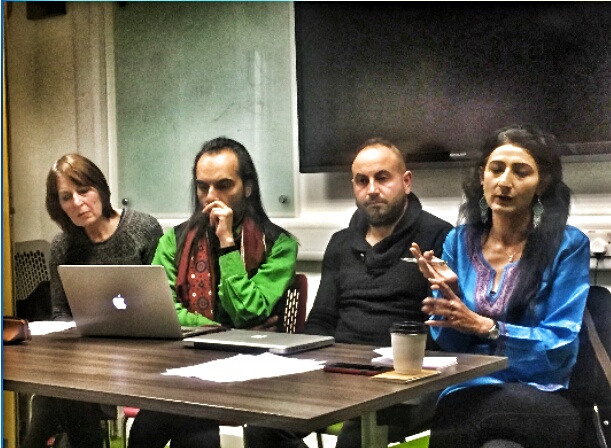Nations are commonly described as a community of people with shared history, language, descent,
culture and inhabiting a particular territory. However, a state, defined as the government that
directs, rules the nations, is often seen as a legitimizing factor for recognition of nations. Hence,
what we see today in global politics are not nations but rather nation-states.
Stateless nations, in today’s environment, occupy a rather unique place in our understanding of
international politics. They are the ones at the margins, challenging the state powers, refusing to
conform to majority identity, the ‘outsiders’ in the inside, the strugglers, the ‘anti-nationals’. Their
dissent and call for reclamation of their own national identity is vital for understanding international
relations beyond the nation-states that define it. The recent Kurdish referendum, Kashmir’s so-called
ally, Pakistan’s Prime Minister rejecting the idea of a free Kashmir, completion of a 100 years of the
Balfour declaration and the subsequent marches and protests that lined the lanes of London, the
continuing issue of Catalonia formed the backdrop of DPIR’s (Department of Politics and
International Relations) last seminar, aptly titled, ‘Stateless nations in the world of Nation-states’.
The speakers include three lecturers from the University of Westminster – Dr Dibyesh Anand, Dr
Maria Holt and Dr Nitasha Kaul and a research associate from the University of Leicester, Dr Omer
Takdemir.
All the four speakers spoke about a different stateless nation, highlighting the struggle of identity
politics in these nations and their commonalities. Anand began by analyzing the ignorance of the
privileged communities on stateless nations, deciphering his own motivation to understand Tibet as
a consequence of rage against his own ignorance on the issue, despite being so close geographically to Tibet and studying in a city (Delhi) that was home to a decent sized Tibetan refugee population.
Giving geopolitical, historical and economic reasons in favor of Tibet being an independent state,
Anand highlighted how Tibet and Tibetan identity is represented around the world and the recent
silence of the world community against China due to economic reasons.
In the first week of November, Theresa May, Britain’s Prime Minister had said, “We are proud of our
pioneering role in the creation of the state of Israel” which is extremely insensitive and offensive to
the Palestinian struggle. Holt stressed on the problematic control of the entire narrative by Israel
and the notion of ‘passive Palestinians’. Speaking against the constant dehumanization of
Palestinians, de-legitimization of their identity and labeling their struggle as terrorism, Holt called for
the need to understand Palestinians on their own terms and talked about her conversations with
Palestinian refugees in Lebanon which was especially insightful.
Analysing the Kurds in Iraq, Takdemir spoke about plausible solutions for the Kurdish nations and
suitable prospective governments. An interesting point was the differentiation between Kurdish
nationalism and Kurdish culture and how this is a determining factor for choosing between a future
prospective state – either a Traditional state that involves modernization and institution of tribals or
a radical democracy which secularizes the Kurdish struggle and includes a feminist aspect.
Talking about Kashmir, Kaul began with the inherent ‘fractures’ in the Kashmiri struggle, but
simultaneously broke the myth of Kashmir being an ‘integral’ part of India which is the central
political narrative adopted by the Indian state. With a brief take on interaction of the histories of
India and Kashmir at various points, before and after the formation of the state of India, Kaul
emphasized on how Kashmiris are presently ‘trapped’; between corruption, their resistance leaders,
the state, and so on. Kashmir being presented as the ‘head’ of Mother India with its gendered
implications and the treatment of Kashmiris being subjected to pellet guns, inhumane torture, rape,
daily humiliation is truly ironic. Kaul talking about the daily treatment of Kashmiris by the Indian
state and its agents –questioning, torture, imprisonment without legit reasoning, impunity of the
Security forces in Kashmir drew gasps across the room. Kaul ended the talk with calling out the
silence of the international community and the blind eye turned by Indians on their own state’s
actions in Kashmir.
The fact that a University’s Politics and International Relations department houses experts on so
many stateless nations speaks volumes and also provides a safe space for many students to voice
their opinions, especially if in opposition to mainstream politics. Such seminars maintain the
presence of a conversation on topics not hitherto discussed or attempted to be silenced. It’s
important to keep the conversation going, understand such situations critically, demand solutions
and break free from the traditional study of ‘interstate’ relations to actual ‘international’ relations.
(The Department, in keeping with its tradition is also organizing a talk on the Rohingya Crisis in
Myanmar.
More details can be found at: https://www.westminster.ac.uk/events/state-
violence-and- the-rohingya- a-case- of-textbook- ethnic-cleansing.)
– By Anna Menon
